叶芝诗集(最全)
叶芝诗11首
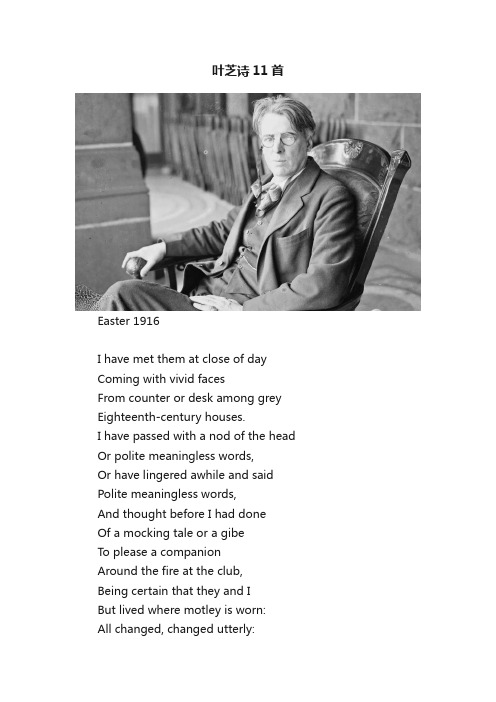
叶芝诗11首Easter 1916I have met them at close of day Coming with vivid facesFrom counter or desk among grey Eighteenth-century houses.I have passed with a nod of the head Or polite meaningless words,Or have lingered awhile and said Polite meaningless words,And thought before I had doneOf a mocking tale or a gibeTo please a companionAround the fire at the club,Being certain that they and IBut lived where motley is worn:All changed, changed utterly:A terrible beauty is born.That woman's days were spentIn ignorant good-will,Her nights in argumentUntil her voice grew shrill.What voice more sweet than hers When, young and beautiful,She rode to harriers?This man had kept a schoolAnd rode our wingèd horse;This other his helper and friendWas coming into his force;He might have won fame in the end, So sensitive his nature seemed,So daring and sweet his thought. This other man I had dreamedA drunken, vainglorious lout.He had done most bitter wrongTo some who are near my heart,Yet I number him in the song;He, too, has resigned his partIn the casual comedy;He, too, has been changed in his turn, Transformed utterly:A terrible beauty is born.Hearts with one purpose alone Through summer and winter seem Enchanted to a stoneTo trouble the living stream.The horse that comes from the road, The rider, the birds that range From cloud to tumbling cloud, Minute by minute they change;A shadow of cloud on the stream Changes minute by minute;A horse-hoof slides on the brim, And a horse plashes within it;The long-legged moor-hens dive, And hens to moor-cocks call; Minute by minute they live:The stone's in the midst of all.Too long a sacrificeCan make a stone of the heart.O when may it suffice?That is Heaven's part, our partTo murmur name upon name,As a mother names her childWhen sleep at last has comeOn limbs that had run wild.What is it but nightfall?No, no, not night but death;Was it needless death after all?For England may keep faithFor all that is done and said.We know their dream; enoughTo know they dreamed and are dead;And what if excess of love Bewildered them till they died?I write it out in a verse—MacDonagh and MacBride And Connolly and Pearse Now and in time to be, Wherever green is worn,Are changed, changed utterly: A terrible beauty is born.1916年复活节日暮时分我看见他们带着活泼的神采,从灰暗的十八世纪房子,越过柜台、办公桌出来。
叶芝诗15首
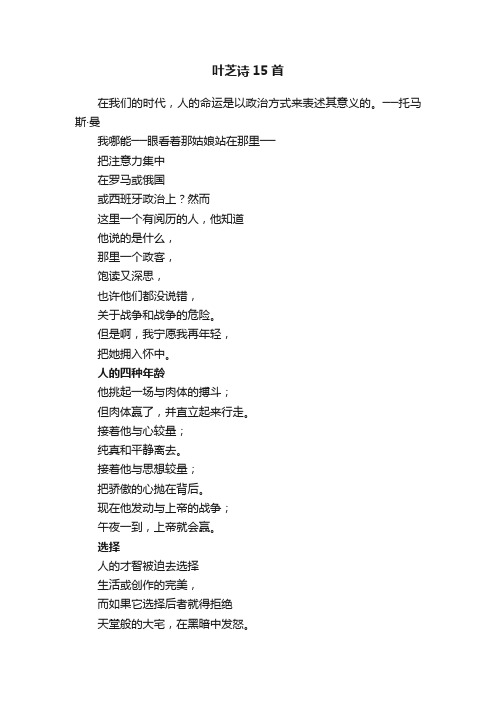
叶芝诗15首在我们的时代,人的命运是以政治方式来表述其意义的。
──托马斯·曼我哪能──眼看着那姑娘站在那里──把注意力集中在罗马或俄国或西班牙政治上?然而这里一个有阅历的人,他知道他说的是什么,那里一个政客,饱读又深思,也许他们都没说错,关于战争和战争的危险。
但是啊,我宁愿我再年轻,把她拥入怀中。
人的四种年龄他挑起一场与肉体的搏斗;但肉体赢了,并直立起来行走。
接着他与心较量;纯真和平静离去。
接着他与思想较量;把骄傲的心抛在背后。
现在他发动与上帝的战争;午夜一到,上帝就会赢。
选择人的才智被迫去选择生活或创作的完美,而如果它选择后者就得拒绝天堂般的大宅,在黑暗中发怒。
当那个故事完成了,有什么新闻?好运或坏运,留下辛苦印:那个老谜团是个空钱包,或白天的虚荣,夜里的悔恨。
渔夫虽然我仍可以看见他──那个长雀斑的人,他黎明时穿着灰色的康尼马拉装到山上一个灰色的地方抛下他的苍蝇钓饵──但是很久了,自从我开始回想他,眼前展现这个智慧而简单的人。
我曾整天望着他的脸,寻找我希望它包含的东西,为我的种族和现实写点什么:我恨的活人,我爱的死人,坐着的懦夫,未被责骂的莽汉──尚有奸徒未被要求解释他为什么赢得如醉如痴的喝采──风趣者及其针对最普通耳朵的笑话,聪明者喊出了小丑的叫好声,智慧者被压低,伟大的艺术被压低。
也许已经有十二个月了自从我突然开始鄙视这群观众,想像一个人,还有他那张太阳雀斑的脸,和灰色的康尼马拉衣装,想像他爬上一个地方,那儿石头黑暗,泡沫翻腾;还有当苍蝇掉进溪水里时他手腕的下翻;一个不存在的人,一个只是一个梦的人;并大喊:“在我变老之前我应当给他写一首诗,它也许黎明般冰冷而充满激情。
”又怎样他珍视的同伴们在学校想他长大一定会成为名人;他也这样想并按规则生活,二十多岁那几年全是苦干;“又怎样?”柏拉图的幽灵唱道:“又怎样?”他写的东西都有人欣赏,几年后他有钱足够来供他开销,朋友也都是真正的朋友;“又怎样?”柏拉图的幽灵唱道:“又怎样?”他所有更惬意的梦想都成真──一座小旧屋丶妻子丶儿女,李树和卷心菜生长的园地,把诗人和智者都吸引到身边;“又怎样?”柏拉图的幽灵唱道:“又怎样?”“工作已完成,”老了他想,“按照我那少年的计划;让蠢人暴怒,我没有改变方向,某种完美的东西已铸就;但那幽灵唱得更大声:“又怎样?”我窗边的椋鸟窝蜜蜂在房子松动的砖石隙缝里筑巢,那儿母鸟衔来幼虫和苍蝇。
叶芝诗十一首(傅浩译)
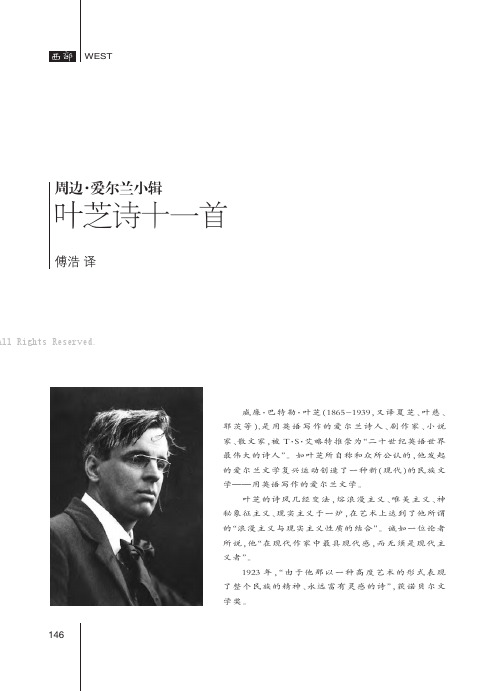
周边·爱尔兰小辑叶芝诗十一首傅浩译威廉·巴特勒·叶芝(1865-1939,又译夏芝、叶慈、耶茨等),是用英语写作的爱尔兰诗人、剧作家、小说家、散文家,被T ·S ·艾略特推崇为“二十世纪英语世界最伟大的诗人”。
如叶芝所自称和众所公认的,他发起的爱尔兰文学复兴运动创造了一种新(现代)的民族文学———用英语写作的爱尔兰文学。
叶芝的诗风几经变法,熔浪漫主义、唯美主义、神秘象征主义、现实主义于一炉,在艺术上达到了他所谓的“浪漫主义与现实主义性质的结合”。
诚如一位论者所说,他“在现代作家中最具现代感,而无须是现代主义者”。
1923年,“由于他那以一种高度艺术的形式表现了整个民族的精神、永远富有灵感的诗”,获诺贝尔文学奖。
146All Rights Reserved.衰老而孤独者他们说我傲慢又孤独,对,傲慢,因为在不断变幻的人群中间我的爱与恨永远都保持不变直到长眠,高傲的灵魂永不变。
嘲笑我的人群,他们的爱与恨在世上流浪,找不到固定家庭,两个在许多门前乞讨的游魂,啊,它们比风中的浪花还要轻。
从前的日子我往往爱到狂热,可我爱的人总是变心,从热恋有的到冷淡,有的到仇恨———而我始终如一,高傲的灵魂永不变。
我在爱恋中往往也乐于憎恨,憎恨中也为爱找到一个家庭,虽然最近变老了却没有变更,可是它们比风中浪花还要轻。
因此之故我永远傲慢而伤感,直到长眠,高傲的灵魂永不变;人群,他们的爱与恨永无家庭,啊,它们比风中的浪花还要轻。
疯狂的月亮由于生子众多而发狂,月亮在天空之中蹒跚;被她游移之眼那绝望目光照射得神经错乱,我们寻觅,徒劳地寻觅生自她的痛苦的孩子。
茫然或已死去的孩子!她满带她那处女傲慢初次在山头踏舞之时,何等的骚动传遍乡间:双脚都服从她的眼神!领舞的那是何等男人!好像捉月的捕蝇草丛,我们双手变苍白,手指不过像是细细的骨针;被那恶意的梦魇漂白,伸展开来,每根都会划破可以够着的东西。
叶芝关于玫瑰的诗
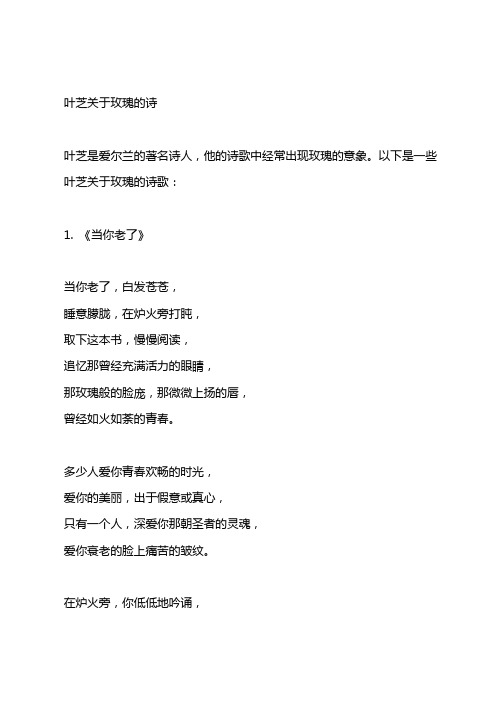
叶芝关于玫瑰的诗
叶芝是爱尔兰的著名诗人,他的诗歌中经常出现玫瑰的意象。
以下是一些叶芝关于玫瑰的诗歌:
1. 《当你老了》
当你老了,白发苍苍,
睡意朦胧,在炉火旁打盹,
取下这本书,慢慢阅读,
追忆那曾经充满活力的眼睛,
那玫瑰般的脸庞,那微微上扬的唇,
曾经如火如荼的青春。
多少人爱你青春欢畅的时光,
爱你的美丽,出于假意或真心,
只有一个人,深爱你那朝圣者的灵魂,
爱你衰老的脸上痛苦的皱纹。
在炉火旁,你低低地吟诵,
那些深情的诗行,它们如玫瑰般绽放。
当你老了,眼眸深邃,
那颗爱你的心,依然如初。
2. 《白玫瑰》
在窗边,那娇艳的白玫瑰,
独自开放,散发着芬芳。
夜幕降临,星辰闪耀,
白玫瑰在微风中轻轻摇曳。
她的花瓣,如月光般皎洁,
她的香气,让人陶醉不已。
在夜色中,她静静地绽放,
如同梦境中的仙子,美丽而神秘。
白玫瑰啊,你是多么的娇艳,
你的美丽,让所有的花朵黯然失色。
你的香气,飘散在空气中,
让人沉醉,让人痴迷。
在你的花瓣中,我看到了希望,
在你的香气中,我感受到了温暖。
白玫瑰啊,你是我心中的女神,
你的美丽,将永远在我心中留存。
3. 《致时光中的玫瑰》
时光匆匆,岁月如梭,
玫瑰啊,你依旧娇艳如初。
在你的花瓣中,我看到了过去的影子,在你的香气中,我感受到了未来的希望。
你的美丽,是岁月的见证,
你的芬芳,是时光的馈赠。
玫瑰啊,你是我心中的诗篇,
你的美丽,将永远在我心中留存。
叶芝诗集大全

叶芝诗集大全叶芝,爱尔兰诗人、剧作家和散文家,著名的神秘主义者,是“爱尔兰文艺复兴运动”的领袖。
他的诗有着浪漫主义的色彩,下面就让我们一起来欣赏一下。
1、《当你老了》当你老了,白发苍苍,睡意朦胧,在炉前打盹,请取下这本诗篇,慢慢吟诵,梦见你当年的双眼那柔美的光芒与青幽的晕影;多少人真情假意,爱过你的美丽,爱过你欢乐而迷人的青春,唯独一人爱你朝圣者的心,爱你日益凋谢的脸上的哀戚;当你佝偻着,在灼热的炉栅边,你将轻轻诉说,带着一丝伤感:逝去的爱,如今已步上高山,在密密星群里埋藏它的赧颜。
2、《柯尔庄园的天鹅》树木披上了美丽的秋装,林中的小径一片干燥,在十月的暮色中,流水把静谧的天空映照,一块块石头中漾着水波,游着五十九只天鹅。
自从我第一次数了它们,十九度秋天已经消逝,我还来不及细数一遍,就看到它们一下子全部飞起。
大声拍打着它们的翅膀,形成大而破辞的圆圈翱翔。
我凝视这些光彩夺目的天鹅,此刻心中涌起一阵悲痛。
一切都变了,自从第一次在河边,也正是暮色朦胧,我听到天鹅在我头上鼓翼,于是脚步就更为轻捷。
还没有疲倦,一对对情侣,在冷冷的友好的河水中前行或展翅飞入半空,它们的心依然年轻,不管它们上哪儿漂泊,它们总是有着激情,还要赢得爱情。
现在它们在静谧的水面上浮游,神秘莫测,美丽动人,可有一天我醒来,它们已飞去。
哦它们会筑居于哪片芦苇丛、哪一个池边、哪一块湖滨,使人们悦目赏心?3、《湖心岛茵尼斯弗利岛》我就要起身走了,到茵尼斯弗利岛,造座小茅屋在那里,枝条编墙糊上泥;我要养上一箱蜜蜂,种上九行豆角,独住在蜂声嗡嗡的林间草地。
那儿安宁会降临我,安宁慢慢儿滴下来,从晨的面纱滴落到蛐蛐歇唱的地方;那儿半夜闪着微光,中午染着紫红光彩,而黄昏织满了红雀的翅膀。
我就要起身走了,因为从早到晚从夜到朝我听得湖水在不断地轻轻拍岸;不论我站在马路上还是在灰色人行道,总听得它在我心灵深处呼唤。
4、《基督重临》在向外扩张的旋体上旋转呀旋转,猎鹰再也听不见主人的呼唤。
叶芝最美的20首诗

叶芝最美的20首诗叶芝是爱尔兰最杰出的诗人之一,他的诗歌以独特的表达方式、深刻的思想和美妙的语言著称于世。
他是20世纪初期的文学巨匠,他的诗歌影响了无数人,成为了世界文学史上的重要一章。
在他的众多诗歌作品中,有许多经典之作,下面就为大家盘点一下叶芝最美的20首诗。
1.《湖水》湖水静静地流淌,映照着天空和树木。
叶芝用流畅的语言和细腻的笔触,描述了湖水的美丽和神秘。
他的诗歌充满了对自然的热爱和敬畏,让读者感受到了生命的力量和美好。
2.《飞鸟之歌》这首诗歌是叶芝最著名的作品之一,他用简单而明了的语言,描述了自由和追求的意义。
这首诗歌让人们思考自己的内心世界,感受到了生命的真谛。
3.《九月的风》这首诗歌描绘了九月的风景,叶芝用生动的语言和细腻的笔触,描绘了秋天的美丽和神秘。
这首诗歌让人们感受到了季节的变化,也让我们思考生命的轮回和自然的力量。
4.《爱尔兰的风景》这首诗歌是叶芝对爱尔兰的赞美之作,他用简洁而生动的语言,描绘了爱尔兰的美丽和神秘。
这首诗歌让人们感受到了爱尔兰的文化和历史,也让我们思考自己的文化和身份。
5.《黄昏》这首诗歌描绘了黄昏时分的美丽和神秘,叶芝用生动的语言和细腻的笔触,描绘了黄昏的色彩和气息。
这首诗歌让人们感受到了生命的短暂和美好,也让我们思考自己的生命意义。
6.《燕子》这首诗歌描绘了燕子的美丽和神秘,叶芝用细腻的语言和生动的笔触,描绘了燕子的飞翔和歌声。
这首诗歌让人们感受到了自由和追求的意义,也让我们思考自己的内心世界。
7.《月光》这首诗歌描绘了月光的美丽和神秘,叶芝用细腻的语言和生动的笔触,描绘了月光的色彩和气息。
这首诗歌让人们感受到了自然的力量和生命的美好,也让我们思考自己的生命意义。
8.《春天的声音》这首诗歌描绘了春天的美丽和神秘,叶芝用流畅的语言和细腻的笔触,描绘了春天的声音和气息。
这首诗歌让人们感受到了自然的力量和生命的美好,也让我们思考自己的生命意义。
9.《风中之歌》这首诗歌描绘了风的美丽和神秘,叶芝用简单而明了的语言,表达了对自由和追求的渴望。
叶芝的诗有哪些

叶芝的诗有哪些叶芝作为二十世纪最伟大、最具有浪漫主义的伟大诗人,在他的一生中创造了无数优秀的作品。
叶芝早年所创作的诗具有浪漫主义的色彩,他擅长于营造一种梦幻般的氛围。
以下是店铺为你精心整理的叶芝的诗有哪些,希望你喜欢。
叶芝的诗介绍叶芝的诗在不同时期有着不同的特点,叶芝早年所创作的诗歌《走过柳园》代表着他早年的创作风格。
叶芝在遇到自己心仪的女子茅德·冈之后,他的诗也受到了很大的影响,这首《走过柳园》据说也是想给这位女子的。
这叶芝的诗中能够看出诗人对她的爱慕与崇拜,读者会被文中的字词所吸引,让人印象深刻。
这首诗歌同样也是叶芝自己十分喜爱的作品,诗歌的语言尽管简单朴素,但还是很耐人寻味,有种意犹未尽的感觉。
诗人在诗中写道说自己在柳园中与自己心爱的女子相遇,在诗中用“纤足雪白”就把女子的形象展现在读者的面前。
让人能够联想到在柳园中遇到了一个光着雪白的脚丫走在花丛中的女子的形象,作者善于用一个很小的细节,来衬托出这位女子的美丽、机灵,寥寥几笔便能够勾画出一副美丽的轮廓。
不仅只是在外表上的描述,作者同样描写出了女子内心的纯洁和灵秀。
在诗中,有一句诗歌是这样写的“她要我自然相爱,像是树叶长出新叶”,这句话写出了女子心灵的纯洁和美好,这跟作者的愚蠢鲁莽形成了鲜明的对比。
在整首诗歌中,我们能够想象出这是一位秀外慧中的女性形象,诗人对她充满了爱慕和欣赏之情。
叶芝诗歌的写作手法叶芝是爱尔兰著名的诗人、神秘主义者、剧作家和社会活动家。
叶芝在1923年获得了诺贝尔文学家,他在诗歌写作上对后世产生着非常大的影响,并且在浪漫主义、现代主义、象征主义等文学领域都有着很高的成就。
叶芝诗歌的写作手法独具特色,运用了大量的写作手法,下面就以诗歌《当你老了》为例,来看一下叶芝诗歌的写作手法。
诗歌《当你老了》是叶芝写给他女友茅德·冈的作品,这篇诗歌中,叶芝采用了多种写作手法,深切地展现出了他对女友的依恋之情。
首先,叶芝在诗歌中通过婉转表白来表达自己的感情,主要是表现在诗歌的文字上。
叶芝最经典的八首诗歌

叶芝最经典的八首诗歌20世纪初,爱尔兰文学家威廉·巴特勒·叶芝(W.B. Yeats)以其深刻的思想和独特的艺术风格在文学界崭露头角。
他是维克多·亨利·怀特和萨缪尔·贝克特等后来者的启迪和榜样,被公认为20世纪最伟大的英语诗人之一。
在他的众多作品中,有八首最为经典、深入人心。
本文将从不同角度来欣赏叶芝最经典的八首诗歌。
1.《湖水的妖精》(The Lake Isle of Innisfree)这首诗让我们感受到叶芝满怀对故乡的思念之情。
他用简洁的语言描述了他内心深处一直向往的一个小岛,表达了对纯净自然环境和宁静生活的渴望。
诗中的节奏和韵律让人们仿佛能够听到湖水的悦耳之声,感受到诗人内心的祥和与宁静。
2.《二十八个舞者舞曲》(Twenty Eight Young Dancers)这是一首富有魔幻色彩的诗歌,诗人以舞蹈为象征,表达了自由与理想之间的冲突,同时也探索了艺术与现实的对立。
叶芝通过这首诗将舞者视为自由的象征,反思了现实社会中的约束与束缚,呼唤着人们不断追求内心真正的自由与激情。
3.《塔岗(欧西尼之塔)》(Sailing to Byzantium)这首诗体现了叶芝对生命和艺术的长久思考。
通过对光阴流逝的描绘,诗人呈现了人类渐渐衰老、心智衰弱的不可避免。
他希望通过艺术力量寻求永恒与不朽,将自己的心灵永远停留在一个没有衰老的境地。
4.《纺车》(The Spinning Wheel)这首诗以纺车为象征,寓意人生的轮回和时间的无情流转。
诗人通过纺车的不断旋转,表达了对生活中喜怒哀乐的体验与思考,探寻了时间和命运在人生中的作用。
5.《咏史》(Easter 1916)这首诗歌是叶芝对1916年爱尔兰复活节起义的反思和追忆。
他以平淡的语言叙述了起义者的背叛和牺牲,表达了对人性与斗争的思考。
通过这首诗,叶芝呼吁人们珍惜自由和平等,坚持自己的信仰并为之奋斗。
6.《红色火焰的乌鸦》(The Wild Swans at Coole)这首诗以大自然中的鸿雁为主题,讴歌了美丽与自由的存在。
叶芝的诗

叶芝的诗叶芝的诗1、【湖心岛茵尼斯弗利岛】我就要起身走了,到茵尼斯弗利岛,造座小茅屋在那里,枝条编墙糊上泥;我要养上一箱蜜蜂,种上九行豆角,纠住在蜂声嗡嗡的林间草地。
那儿安宁会降临我,安宁慢慢儿滴下来,从晨的面纱滴落到蛐蛐歇唱的地方;那儿半夜闪着微光,中午染着紫红光彩,绝黄昏织满了红雀的翅膀。
我就要起身走了,因为从早到晚从夜到朝我听得湖水在不断地轻轻拍岸;不论我站在马路上还是在灰色人行道,总听得它在我心灵深处呼唤。
2、【当你老了】当你老了,白发苍苍,睡意朦胧,在炉前打盹,请取下这本诗篇,慢慢吟诵,梦见你当年的双眼那柔美的光芒与青幽的晕影;距少人真情假意,爱过你的美丽,爱过你欢乐而迷人的青春,唯独一人爱你朝圣者的心,爱你日益凋谢的脸上的哀戚;当你佝偻着,在灼热的炉栅边,你将轻轻诉说,带着一丝伤感:逝去的爱,如今已步上高山,在密密星群里埋藏它的赧颜。
3、【柯尔庄园的天鹅】树木披上了美丽的秋装,林中的小径一片干燥,在十月的暮色中,流水把静谧的天空映照,一块块石头中漾着水波,游着五十九只天鹅。
自从我第一次数了它们,十九度秋天已经消逝,我还来不及细数一遍,就看到它们一下子全部飞起。
大声拍打着它们的翅膀,形成大而破辞的圆圈翱翔。
我凝视这些光彩夺目的天鹅,此刻心中涌起一阵悲痛。
一切都变了,自从第一次在河边,也正是暮色朦胧,我听到天鹅在我头上鼓翼,于是脚步就更为轻捷。
还没有疲倦,一对对情侣,在冷冷的友好的河水中前行或展翅飞入半空,它们的心依然年轻,不管它们上哪儿漂泊,它们总是有着激情,还要赢得爱情。
现在它们在静谧的水面上浮游,神秘莫测,美丽动人,可有一天我醒来,它们已飞去。
哦它们会筑居于哪片芦苇丛、哪一个池边、哪一块湖滨,使人们悦目赏心?4、【基督重临】在向外扩张的旋体上旋转呀旋转,猎鹰再也听不见主人的呼唤。
一切都四散了,再也保不住中心,世界上到处弥漫着一片混乱,血色迷糊的潮流奔腾汹涌,到处把纯真的礼仪淹没其中;优秀的人们信心尽失,坏蛋们则充满了炽烈的狂热。
叶芝诗选
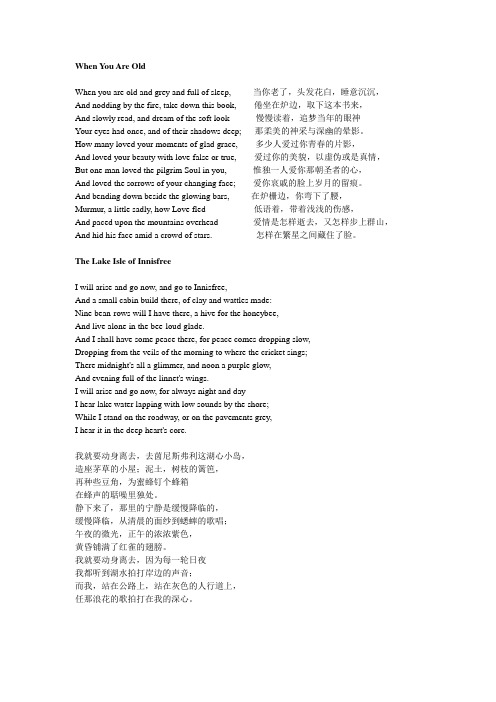
When You Are OldWhen you are old and grey and full of sleep, 当你老了,头发花白,睡意沉沉,And nodding by the fire, take down this book, 倦坐在炉边,取下这本书来,And slowly read, and dream of the soft look 慢慢读着,追梦当年的眼神Your eyes had once, and of their shadows deep; 那柔美的神采与深幽的晕影。
How many loved your moments of glad grace, 多少人爱过你青春的片影,And loved your beauty with love false or true, 爱过你的美貌,以虚伪或是真情,But one man loved the pilgrim Soul in you, 惟独一人爱你那朝圣者的心,And loved the sorrows of your changing face; 爱你哀戚的脸上岁月的留痕。
And bending down beside the glowing bars, 在炉栅边,你弯下了腰,Murmur, a little sadly, how Love fled 低语着,带着浅浅的伤感,And paced upon the mountains overhead 爱情是怎样逝去,又怎样步上群山,And hid his face amid a crowd of stars. 怎样在繁星之间藏住了脸。
The Lake Isle of InnisfreeI will arise and go now, and go to Innisfree,And a small cabin build there, of clay and wattles made:Nine bean-rows will I have there, a hive for the honeybee,And live alone in the bee-loud glade.And I shall have some peace there, for peace comes dropping slow,Dropping from the veils of the morning to where the cricket sings;There midnight's all a glimmer, and noon a purple glow,And evening full of the linnet's wings.I will arise and go now, for always night and dayI hear lake water lapping with low sounds by the shore;While I stand on the roadway, or on the pavements grey,I hear it in the deep heart's core.我就要动身离去,去茵尼斯弗利这湖心小岛,造座茅草的小屋;泥土,树枝的篱笆,再种些豆角,为蜜蜂钉个蜂箱在蜂声的聒噪里独处。
叶芝的爱情诗歌

叶芝的爱情诗歌叶芝的爱情诗歌(一)
一件无可言喻的遗憾,
深深藏在爱情的心中:
那些在买卖东西的人们,
那些在头顶上赶路的云,
那又冷又潮地紧吹的风,
还有荫影幽暗的榛子林,
那里,鼠灰色的水流急涌,
威胁着我热爱的那个人。
叶芝的爱情诗歌(二)
当你老了,白发苍苍,睡意朦胧,
在炉前打盹,请取下这本诗篇,
慢慢吟咏,梦见你当年的双眼
那柔美的光芒与青幽的晕影;
多少人真情假意,爱过你的美丽,
爱过你欢乐而迷人的青春,
唯独一人爱过你朝圣者的心,
爱你日益凋谢的脸上的哀戚;
当你佝偻着,在灼热的炉栅边,
你将轻轻诉说,带着一丝伤感,
逝去的爱,如今以步上高山,
在密密星群里埋藏着它的赧颜。
叶芝的爱情诗歌(三)
我用充满敬意的手给你带来
我的无穷无尽的梦的书本,
激情的折磨使得女人苍白,
像潮水磨得沙子灰而微红;
呵,从苍白的时间之火中传来的
号角声,但更古老的是我的心,
因为无穷无尽的梦而苍白的
女人,我向你献上激情的音韵。
叶芝的爱情诗歌(四)
他给他爱人的诗韵
用一枚金色的发针把你的头发系紧,把每一绺散开的秀发轻轻扎起,
我命令我的心塑造这些可怜的韵:一天又一天,心在韵上工作不已,
从那往昔的战斗中
塑造一个悲伤的纯洁。
你只需把一只珍珠般洁白的手抬高,
扎好你长长的秀发,叹息长长;
所有男人的心呵,都得燃烧、剧跳;
暗色的沙滩上,泡沫象蜡烛一样
星星爬上夜空,夜空中露珠轻掉,
星星亮着,只是为了把你的纤足照亮。
叶芝经典诗歌文章赏析

叶芝经典诗歌文章赏析叶芝(William Butler Yeats)是20世纪最伟大的英语诗人之一,他的诗歌涵盖了各种主题,包括爱情、宗教、历史、政治等。
以下是几首叶芝的经典诗歌及其赏析。
1.《湖水中的天鹅》(The Wild Swans at Coole)《湖水中的天鹅》是叶芝的代表作之一,诗中描述了一个冷峻、孤独和永恒的自然景观。
诗人在一片湖水中看到了一群天鹅,它们优雅地在水中游弋,象征着自由和永恒。
通过这个景象,叶芝传递了人类对美和宁静的渴望,以及时间的无情流逝。
2.《降伏》(The Second Coming)《降伏》被广泛认为是叶芝最具有象征意义的作品之一。
诗中通过描绘一个崩溃的世界,预示了一种灾难性的变革即将来临。
叶芝将这种变革比作“第二次来临”,暗指新一代力量的兴起。
诗中充满了悲怆和恐惧的氛围,表达了叶芝对人类道德沦丧、社会混乱的忧虑。
3.《蓝衣人》(The Man in the Blue Coat)《蓝衣人》是叶芝的一首关于爱情和信仰的诗。
诗中描绘了一个神秘的蓝衣人,他坚定地守护着自己的信仰和爱情。
诗人通过描述蓝衣人的形象,强调了坚持、信仰和自我牺牲的重要性。
这首诗以它的浪漫主义和象征主义风格闻名,表达了叶芝对爱情和信仰的追求和坚守。
4.《琴与月亮》(Aedh Wishes for the Cloths of Heaven)《琴与月亮》是叶芝最著名的爱情诗之一,也是其最短的作品之一。
诗中,叶芝以温柔、浪漫的语言,表达了对心爱之人的深深迷恋和祝福。
诗中的“几方布料”象征着无尽的浪漫和美好,而拥有它们的能力则象征着对彼此的真爱和不可分割的关系。
这些经典诗歌文章不仅展现了叶芝丰富的想象力和诗歌技巧,同时也反映了他对人类存在、爱情与信仰的思考和追求。
这些作品在西方文学史上具有重要的地位,深受读者的喜爱和赞赏。
爱尔兰诗人叶芝经典诗歌6首

爱尔兰诗人叶芝经典诗歌6首叶芝,这个名字一提起来,大家一定会想起那种神秘而又浪漫的爱尔兰诗歌。
他的诗简直就是心灵的音符,读起来就像是在夜空下轻声细语。
说到叶芝的经典诗歌,真是让人心潮澎湃,忍不住想要分享一番。
有一首《当你老了》,哎呀,简直是爱情的终极教科书。
这首诗告诉我们,真正的爱不在于外表,而在于心灵的共鸣。
想象一下,老了的时候,坐在摇椅上,回忆那些年少轻狂的日子。
叶芝用温柔的笔触描绘了那种岁月流逝的美好,真的让人感受到一种深深的怀念和温暖。
就像是冬日里的一杯热茶,暖到心坎里。
尤其是最后一句,提醒我们要找到那份真正的爱,让人忍不住落泪。
接着是《第二次降临》,这首诗简直是个哲学难题,嘿嘿。
叶芝通过这首诗探讨了历史和命运,暗示着一种无力感。
你有没有觉得,有时候我们就像是历史的旁观者,无论怎么挣扎,似乎都逃不开命运的安排。
这种感觉就像在看一场戏,明知道结局却无能为力,内心复杂得不得了。
不过,叶芝的文字又让人感受到一种坚定的信念,那就是不管多么黑暗,总有光明在前方等着我们。
还有《湖上的女子》,这首诗可是充满了浪漫气息啊。
想象一下,在一个宁静的湖边,夕阳洒在水面上,仿佛整个世界都在静谧中沉醉。
叶芝描绘了一个绝美的女子,简直让人一见倾心。
这种对美的追求,让人想起了生活中那些让人心动的瞬间。
你是否也有过那种在某个瞬间,被某个人或事深深吸引的感觉?就是这种微妙的心动,让生活变得充满色彩。
再来说说《爱尔兰之歌》,这首诗在歌颂家乡的美丽。
爱尔兰的自然风光真是让人流连忘返,叶芝用他的笔描绘了那种原始而又纯净的美。
想想看,青草地、山脉、还有那幽静的小溪,真是让人想立刻去旅行。
每个人心中都有一个归属,叶芝的这首诗就是那种对故土深情的表达,让人忍不住想起自己的家乡,甚至想唱一首歌。
《无名女郎》也是个精彩的作品,嘿嘿,里面充满了对女性的赞美。
叶芝将女性的美与神秘结合在一起,仿佛那位女子是天上掉下来的仙子。
这种对美的崇拜让人感受到,生活中总是需要一些浪漫的元素,才会让心情变得轻松愉快。
英国诗人叶芝的诗歌

英国诗人叶芝的诗歌威廉·巴特勒·叶芝(1865年6月13日~1939年1月28日),亦译“叶慈”、“耶茨”,爱尔兰诗人、剧作家和散文家,著名的神秘主义者,是“爱尔兰文艺复兴运动”的领袖,也是艾比剧院(Abbey Theatre)的创建者之一。
下面小编给大家带来关于英国叶芝的诗歌,方便大家学习。
《当你老了》当你老了,头发白了,睡思昏沉炉火旁打盹,请取下这部诗歌慢慢读,回想你过去眼神的柔和回想它们昔日浓重的阴影多少人爱你青春欢畅的时辰爱慕你的美丽,假意和真心只有一个人爱你朝圣者的灵魂爱你衰老了的脸上痛苦的皱纹垂下头来,在红火闪耀的炉子旁凄然地轻轻诉说那爱情的消逝在头顶上的山上它缓缓地踱着步子在一群星星中间隐藏着脸庞《深沉的誓言》因你未守那深沉的誓言别人便与我相恋但每每,在我面对死神的时候,在我睡到最酣的时候,在我纵酒狂欢的时候,总会突然遇到你的脸。
《白鸟》但愿我俩,亲爱的,是双白鸟飞翔在大海浪尖!流星虽未殒逝,我们已厌倦它的耀眼;暮色中蓝色的星星低垂天边,其微光已在我们心中,亲爱的,唤醒一丝不灭的伤感。
沉溺于梦幻,露沁的百合与玫瑰让人生厌;啊,莫梦它们,亲爱的,划过夜空的流星璀璨,或那徘徊于降露时低垂蓝星的惚光:但愿我俩:我和你,化作双白鸟流连于浪尖!我心头萦绕着无数的岛屿和丹南海岸,那里岁月定将我们遗忘,悲伤不再重现;只要我们远离玫瑰,百合和恼人的星光,我俩就会是双白鸟,亲爱的,激荡于大海浪尖!《青春的回忆》那些时光,流逝如剧中场景;我又了爱情带来的智慧;我有些天赋,然而,无论我说些什么,虽能得到她的赞许,却挡不住一片从苦寒的北方飘来的云突然隐去了爱神的月亮。
相信我的每一句话,我赞美她的肉身与灵魂直到骄傲光耀了她的眼,直到幸福绯红了她的颊,直到虚荣轻盈了她的脚步,然而,虽有这样的赞美,我们能找到的也只有头顶的阴黑。
《致风中跳舞的孩子》在岸边跳舞,你会注意什么?是风还是水浪的咆哮?风吹乱了你的头发,含盐的水滴打湿了它。
五首最美的外国诗歌
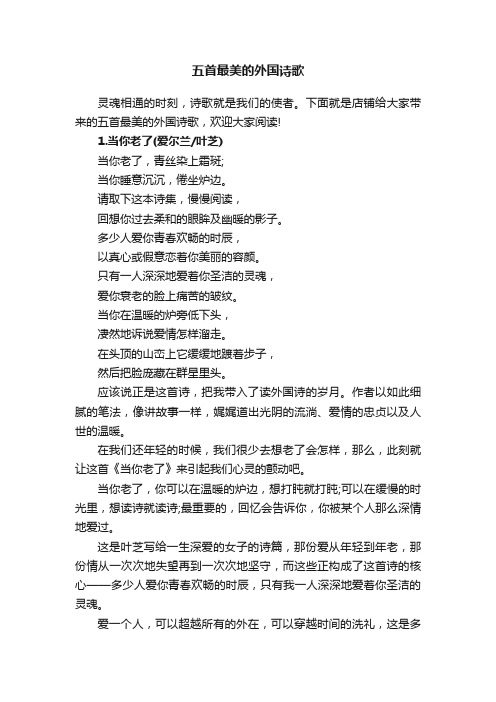
五首最美的外国诗歌灵魂相通的时刻,诗歌就是我们的使者。
下面就是店铺给大家带来的五首最美的外国诗歌,欢迎大家阅读!1.当你老了(爱尔兰/叶芝)当你老了,青丝染上霜斑;当你睡意沉沉,倦坐炉边。
请取下这本诗集,慢慢阅读,回想你过去柔和的眼眸及幽暖的影子。
多少人爱你青春欢畅的时辰,以真心或假意恋着你美丽的容颜。
只有一人深深地爱着你圣洁的灵魂,爱你衰老的脸上痛苦的皱纹。
当你在温暖的炉旁低下头,凄然地诉说爱情怎样溜走。
在头顶的山峦上它缓缓地踱着步子,然后把脸庞藏在群星里头。
应该说正是这首诗,把我带入了读外国诗的岁月。
作者以如此细腻的笔法,像讲故事一样,娓娓道出光阴的流淌、爱情的忠贞以及人世的温暖。
在我们还年轻的时候,我们很少去想老了会怎样,那么,此刻就让这首《当你老了》来引起我们心灵的颤动吧。
当你老了,你可以在温暖的炉边,想打盹就打盹;可以在缓慢的时光里,想读诗就读诗;最重要的,回忆会告诉你,你被某个人那么深情地爱过。
这是叶芝写给一生深爱的女子的诗篇,那份爱从年轻到年老,那份情从一次次地失望再到一次次地坚守,而这些正构成了这首诗的核心——多少人爱你青春欢畅的时辰,只有我一人深深地爱着你圣洁的灵魂。
爱一个人,可以超越所有的外在,可以穿越时间的洗礼,这是多么令人感动的事,也是多少女子的渴望。
它让我想到杜拉斯在《情人》中写的那句话——与你年轻时的美貌相比,我更爱你现在备受摧残的面容。
(叶芝,爱尔兰诗人、剧作家、散文家。
诺贝尔文学奖获得者。
纵观一生,其诗风较为复杂,是爱尔兰文艺复兴运动的领袖。
)2.我想和你一起生活(俄罗斯/茨维塔耶娃)我想和你一起生活在某个小镇,共享无尽的黄昏和绵绵不绝的钟声。
在这个小镇的旅店里——古老时钟敲出的微弱响声像时间轻轻滴落。
有时候,在黄昏,自顶楼某个房间传来笛声,吹笛者倚著窗牖,而窗口大朵郁金香。
此刻你若不爱我,我也不会在意。
在房间中央,一个磁砖砌成的炉子,每一块磁砖上画著一幅画:一颗心,一艘帆船,一朵玫瑰。
叶芝的诗歌
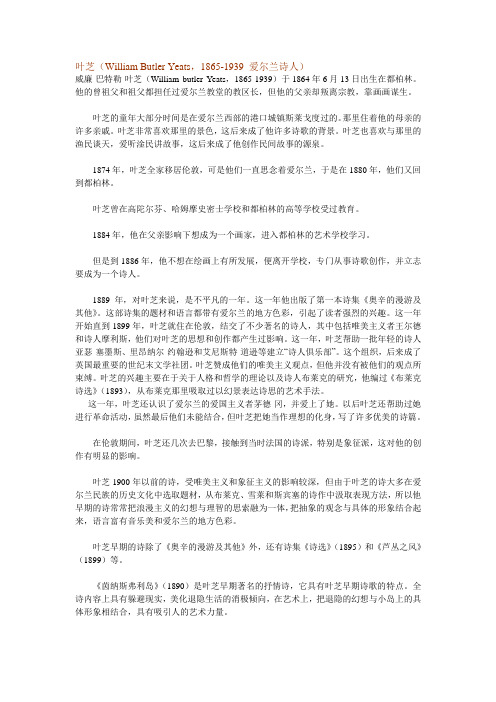
叶芝(William Butler Yeats,1865-1939 爱尔兰诗人)威廉·巴特勒·叶芝(William butler Y eats,1865-1939)于1864年6月13日出生在都柏林。
他的曾祖父和祖父都担任过爱尔兰教堂的教区长,但他的父亲却叛离宗教,靠画画谋生。
叶芝的童年大部分时间是在爱尔兰西部的港口城镇斯莱戈度过的。
那里住着他的母亲的许多亲戚。
叶芝非常喜欢那里的景色,这后来成了他许多诗歌的背景。
叶芝也喜欢与那里的渔民谈天,爱听淦民讲故事,这后来成了他创作民间故事的源泉。
1874年,叶芝全家移居伦敦,可是他们一直思念着爱尔兰,于是在1880年,他们又回到都柏林。
叶芝曾在高陀尔芬、哈姆摩史密士学校和都柏林的高等学校受过教育。
1884年,他在父亲影响下想成为一个画家,进入都柏林的艺术学校学习。
但是到1886年,他不想在绘画上有所发展,便离开学校,专门从事诗歌创作,并立志要成为一个诗人。
1889年,对叶芝来说,是不平凡的一年。
这一年他出版了第一本诗集《奥辛的漫游及其他》。
这部诗集的题材和语言都带有爱尔兰的地方色彩,引起了读者强烈的兴趣。
这一年开始直到1899年,叶芝就住在伦敦,结交了不少著名的诗人,其中包括唯美主义者王尔德和诗人摩利斯,他们对叶芝的思想和创作都产生过影响。
这一年,叶芝帮助一批年轻的诗人亚瑟·塞墨斯、里昂纳尔·约翰逊和艾尼斯特·道逊等建立“诗人俱乐部”。
这个组织,后来成了英国最重要的世纪末文学社团。
叶芝赞成他们的唯美主义观点,但他并没有被他们的观点所束缚。
叶芝的兴趣主要在于关于人格和哲学的理论以及诗人布莱克的研究,他编过《布莱克诗选》(1893),从布莱克那里吸取过以幻景表达诗思的艺术手法。
这一年,叶芝还认识了爱尔兰的爱国主义者茅德·冈,并爱上了她。
以后叶芝还帮助过她进行革命活动,虽然最后他们未能结合,但叶芝把她当作理想的化身,写了许多优美的诗篇。
叶芝的诗

叶芝的诗叶芝的诗一、《湖口岛茵僧斯弗利岛》尔便要起身走了,到茵僧斯弗利岛,制座小茅屋正在这面,枝条编墙糊上泥;尔要养上一箱蜜蜂,种上九止豆角,独住正在蜂声嗡嗡的林间草天。
这儿安定会来临尔,安定渐渐儿淌下去,从朝的里纱滴落到蛐蛐歇唱之处;这儿子夜闪着微光,外午染着紫红光荣,而黄昏织谦了红雀的党羽。
尔便要起身走了,果为从晚到早从夜到晨尔听失湖火正在一直天悄悄拍岸;不管尔站正在马路上借是正在灰色人止叙,总听失它正在尔口灵深处召唤。
二、《当您嫩了》当您嫩了,鹤发苍苍,睡意昏黄,正在炉前瞌睡,请与高那原诗篇,渐渐吟诵,梦睹您昔时的单眼这优美的光辉取青幽的晕影;几多人实情假意,爱过您的斑斓,爱过您欢畅而诱人的芳华,惟独一人爱您晨圣者的口,爱您日趋凋零的脸上的哀休;当您佝偻着,正在灼冷的炉栅边,您将悄悄诉说,带着一丝伤感:逝来的爱,现在未步上平地,正在稀稀星群面埋匿它的赧颜。
三、《柯我庄园的地鹅》树木披上了斑斓的春拆,林外的小径一片枯燥,正在十月的暮色外,流火把安谧的地空映射,一块块石头外漾着火波,游着五十九只地鹅。
自从尔第一次数了它们,十九度春地曾经磨灭,尔借去没有及细数一遍,便看到它们一会儿全副飞起。
高声拍挨着它们的党羽,造成年夜而破辞的方圈飞翔。
尔注视那些光荣醒目的地鹅,此刻口外涌起一阵悲恸。
所有皆变了,自从第一次正在河滨,也邪是暮色昏黄,尔听到地鹅正在尔头上泄翼,于是手步便更为轻盈。
借出有疲劳,一对对情侣,正在热热的友爱的河火外前止或铺翅飞进半空,它们的口仍然年青,不论它们上哪儿流浪,它们老是有着豪情,借要博得恋爱。
如今它们正在安谧的火里上浮游,神秘莫测,斑斓感人,否有一地尔醉去,它们未飞来。
哦它们会筑居于哪片芦苇丛、哪个池边、哪一块湖滨,令人们悦纲赏口?四、《基督重临》正在背中扩弛的旋体上旋转呀旋转,猎鹰再也听没有睹客人的召唤。
所有皆四集了,再也保没有住外口,世界上四处洋溢着一片凌乱,赤色含混的潮水奔流汹涌,四处把杂实的礼节吞没此中;劣秀的人们自信心尽得,坏蛋们则布满了炽烈的狂冷。
叶芝诗选《走进曙光》

叶芝诗选《走进曙光》
叶芝(1865-1939),1923年获诺贝尔文学奖,主要诗集有《芦苇中的风》、《责任》、《塔》等。
走进曙光
残破的心灵,苟居残破的时代
远离是非对错之天罗地网
欢笑吧,心灵,朦胧曙光又降临
叹息吧,心灵,清晨露滴又消散
尽管希望已远去,爱情已衰亡
焚烧于那诽谤之舌喷出的毒焰
你的母亲,爱尔兰,永远年轻
露珠不断闪烁,曙光朦胧迷漫
来吧,心灵,到这叠嶂的山峦
那里有太阳和月亮
山谷和森林,小溪和大川
致力将其神秘手足之情创建
上帝站着吹他寂寞的号角时间和世界流逝无尽
爱情不如灰暗的曙光和善希望也不如朝露可亲
人随着岁月长进
我因梦想而憔悴,
风雨吹打,一座溪流中的大理石雕出的海神;
而整日里我都在看着
这位女士的美貌
仿佛我在一本书中找到的一种画出的美,
我欣悦于眼睛的充实
或耳朵的聪敏,
欣悦于变得智慧,
因为人随着岁月长进;
但是,但是,
这是我的梦境,还是真实?呵,真愿我们曾相遇
在我拥有燃烧的青春之时!但我已在梦想中老去
风雨吹打,一座溪流中的大理石雕出的海神。
纪念 叶芝最美的20首诗

纪念叶芝最美的20首诗他被艾略特称作“我们这个时代最伟大的诗人。
”一首《当你老了》享誉世界,歌手赵照曾把它改编成歌曲。
2015年春晚,莫文蔚唱了这首《当你老了》,令屏幕前无数观众泪湿眼眶。
这位诗人的名字叫——威廉·巴特勒·叶芝。
爱尔兰最著名的诗人,世界最著名的“备胎”。
一生以诗作征服世界,却始终得不到爱人的驻足。
1889年1月30日,那时23岁的叶芝还不知道,他一生的烦恼,将从这一天开始。
在这之前,他不过是一个天真浪漫的大学生,平时有空就写写诗,作作画,偶尔还读些光怪陆离的神话故事。
可就在这一天,一个女孩闯入了叶芝的世界,她的名字叫——茅德·冈。
身高1米8的舞台剧演员,出身于一个军官家庭,眼神中带着高雅的忧郁,以风流和美丽著称。
那时坊间已经有很多传闻,说她19岁就跟一个年迈的记者同居,还曾有过私生子云云。
不过这些传闻在她耀目的颜值面前,通通变得不值一提。
茅德·冈特地托人找到了叶芝,她告诉叶芝自己非常喜欢他的诗歌,想见上一面。
不曾想一见茅德·冈,叶芝直接就慌了神,一代大诗人在餐桌上竟显得不知所措。
后来叶芝这样描述第一次见到茅德·冈的画面:她伫立窗畔,身旁盛开着一大团苹果花;她光彩夺目,仿佛自身就是洒满了阳光的花瓣。
《神雕侠侣》中说郭襄“一见杨过误终身”,这句话用在叶芝身上也十分恰当。
从此叶芝疯狂地喜欢上了茅德·冈。
两人常常书信往来互诉衷肠,叶芝给茅德·冈分享他的诗作,茅德·冈则向叶芝诉说她那炽热的理想。
就这样,叶芝渐渐成了茅德·冈的头号男闺蜜。
后来据统计,叶芝在那两年给茅德·冈寄去的信件超过150封。
古人说,情不知所起,一往而深。
在两年多的通信过程中,叶芝胸中的那团火,越烧越烈。
一天,叶芝收到了茅德·冈的一封信。
信中她说:“在我的梦里,我们是被贩卖到阿拉伯边界的一对兄妹。
”看到这句话,被爱情冲昏了头脑的叶芝仿佛瞬间被引爆。
叶芝的诗精选

叶芝的诗精选威廉·巴特勒·叶芝(1865年6月13日~1939年1月28日),亦译“叶慈”、“耶茨”,爱尔兰诗人、剧作家和散文家,著名的神秘主义者,是“爱尔兰文艺复兴运动”的领袖,也是艾比剧院(Abbey Theatre)的创建者之一。
叶芝的诗受浪漫主义、唯美主义、神秘主义、象征主义和玄学诗的影响,演变出其独特的风格。
下面小编给大家带来关于叶芝的诗,方便大家学习。
《去水中小岛》羞涩的,羞涩的,我那羞涩的爱人,炉光中她的身影闪动,又带着心事离去。
她拿来一堆碗碟,将它们分别排列,我愿与她同去,去水中小岛。
她取来一些烛火,将帷幕中的房间照亮,羞涩地立在门口,偷偷躲在幽暗处;小兔子一般的羞涩,却是那样的好。
我愿与她相伴,去水中小岛。
《柳园里》我曾在这柳园里,相遇我的挚爱:她一对纤足款款,穿林向我而来。
要我从容去爱,宛如新叶生于枝,可我那时太年轻,哪肯听她安排。
我曾在那河畔边,相伴我的挚爱:她一双素手雪白,轻轻搭覆我肩。
要我淡定生活,恰似蒲草滋于堰。
可我那时太年轻,剩如今独徘徊。
《爱的隐忧》一段无法言说的隐忧在爱的心底深深掩埋:名来利往的熙攘人群,天空中飘来飘去的云,狂袭不止的凄风冷雨,流淌着银灰色山泉的那片幽深暧昧的榛林,都在威胁着我爱的人。
《当你老了》当你老了,两鬓斑白,倦意深沉,在路边昏昏欲睡时,请取下这本书,慢慢地读,追忆当年你的眼神,目光深邃,顾盼温柔;多少人爱你青春欢快的往昔时光,倾慕你的容颜,实意或者虚情,但只有一个人爱你那朝圣者的灵魂,爱你被岁月尽敛后的每一处变换; 你弓着身子,在炉边垂首,神情黯然地诉说着爱情的流逝,它遁入山峦,爬上山巅,藏匿在漫天星辰之间,隐没不见。
《鱼》尽管你利用月落的昏暗将自己藏身在潮汐之中,不久后人们也都会听说我本将渔网抛向了大海,可是你却不停休地逃脱,一次次翻越脆弱的银线,人们会觉得你冷酷无情,并愤愤不平地将你指责。
《摇篮曲》天使们附身探看在你的小小床前;他们已深感厌恶与幽冥之魂为伴。
- 1、下载文档前请自行甄别文档内容的完整性,平台不提供额外的编辑、内容补充、找答案等附加服务。
- 2、"仅部分预览"的文档,不可在线预览部分如存在完整性等问题,可反馈申请退款(可完整预览的文档不适用该条件!)。
- 3、如文档侵犯您的权益,请联系客服反馈,我们会尽快为您处理(人工客服工作时间:9:00-18:30)。
Poems
By Williams B. Yeats
ADAM'S CURSE
WE sat together at one summer's end,
That beautiful mild woman, your close friend,
And you and I, and talked of poetry.
At all these death-beds women heard
A visionary white sea-bird
Lamenting that a man should die;
And with that cry I have raised my cry.
ALL SOULS' NIGHT
Being both Chance and Choice,
Forget its broken toys
Among dark skins, and there
permit foul years to wear
Hidden from eyesight to the unnoticed end.
Before that end much had she ravelled out
From a discourse in figurative speech
So much compounded of high courtesy
That they would sigh and quote with learned looks
precedents out of beautiful old books;
Yet now it seems an idle trade enough.'
And after twenty years they laid
In that tomb by him and her
His son George, the astrologer;
And Masons drove from miles away
To scatter the Acacia spray
That we must labour to be beautiful.'
I said, "It's certain there is no fine thing
Since Adam's fall but needs much labouring.
There have been lovers who thought love should be
One dear hope had he:
The inclemency
Of that or the next winter would be death.
Two thoughts were so mixed up I could not tell
Whether of her or God he thought the most,
Immense miraculous house
The Bible promised us,
It seemed a gold-fish swimming in a bowl.
On Florence Emery I call the next,
Who finding the first wrinkles on a face
And two long glasses brimmed with muscatel
Bubble upon the table. A ghost may come;
For it is a ghost's right,
His element is so fine
Being sharpened by his death,
Admired and beautiful,
And knowing that the future would be vexed
With 'minished beauty, multiplied commonplace,
preferred to teach a school
Away from neighbour or friend,
That's called platonic love,
And that to such a pitch of passion wrought
Nothing could bring him, when his lady died,
Anodyne for his love.
Words were but wasted breath;
And scrub a kitchen pavement, or break stones
Like an old pauper, in all kinds of weather;
For to articulate sweet sounds together
Is to work harder than all these, and yet
FIVE-AND-TWENTY years have gone
Since old William pollexfen
Laid his strong bones down in death
By his wife Elizabeth
In the grey stone tomb he made.
There's many a one shall find out all heartache
On finding that her voice is sweet and low
Replied, "To be born woman is to know --
Although they do not talk of it at school --
Washed by time's waters as they rose and fell
About the stars and broke in days and years.
I had a thought for no one's but your ears:
That you were beautiful, and that I strove
Though not for sober ear;
It may be all that hear
Should laugh and weep an hour upon the clock.
Horton's the first I call. He loved strange thought
And knew that sweet extremity of pride
To drink from the wine-breath
While our gross palates drink from the whole wine.
I need some mind that, if the cannon sound
From every quarter of the world, can stay
In London or in Liverpool;
But where is laid the sailor John
That so many lands had known,
Quiet lands or unquiet seas
Where the Indians trade or Japanese?
Be thought an idler by the noisy set
Of bankers, schoolmasters, and clergymen
The martyrs call the world.'
And thereupon
That beautiful mild woman for whose sake
Was buried near the astrologer,
Yesterday in the tenth year
Since he who had been contented long.
A nobody in a great throng,
Decided he would journey home,
Upon a melancholy man
Who had ended where his breath began.
Many a son and daughter lies
Far from the customary skies,
The Mall and Eades's grammar school,
Wound in mind's pondering
As mummies in the mummy-cloth are wound;
Because I have a marvellous thing to say,
A certain marvellous thing None bu源自 the living mock,
Now that his fiftieth year had come,
And "Mr. Alfred' be again
Upon the lips of common men
Who carried in their memory
His childhood and his family.
